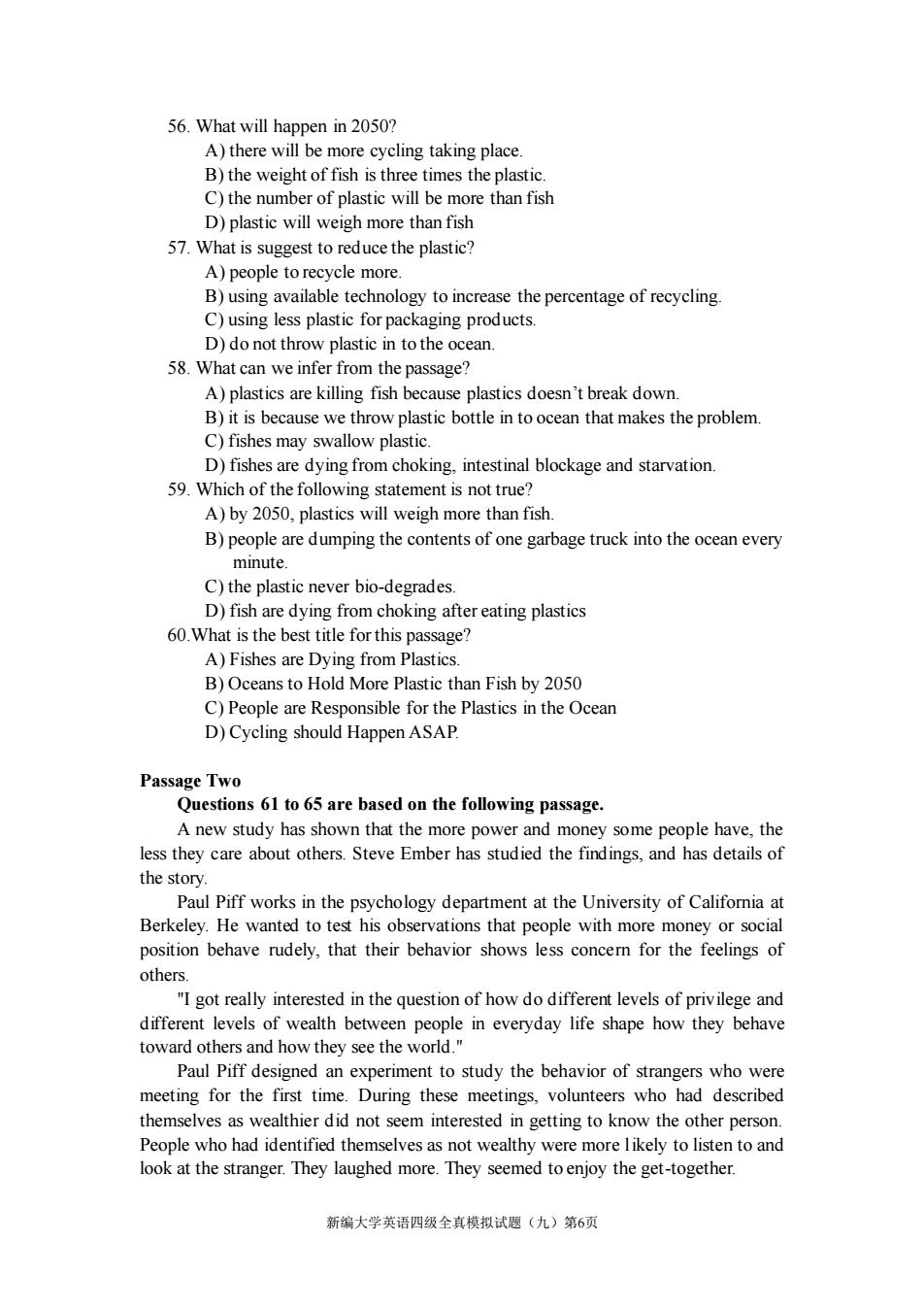正在加载图片...

56.What will happen in? A)there will be more cycling taking place B)the weight of fish is three times the plastic. C)the number of plastic will be more than fish D)plastic will weigh more than fish 57.What is suggest to reduce the plastic? A)people to recycle more B)using available technology to increase the percentage of recycling. C)using less plastic for packaging products D)do not throw plastic in tothe ocean. 58.What can we infer from the passage? A)plastics are killing fish b use plastics doesn't break dowr B)it is because we throw plastic bottle in to ocean that makes the problem C)fishes may swallow plastic D)fishes are dying from choking,intestinal blockage and starvation. 59.Which of the following statement is not true? A)by 2050,plastics will weigh more than fish B)people are dumping the contents of one garbage truck into the ocean every minute C)the plastic never bio-degrades. D)fish are dying from choking after eating plastics 60.What is the best title for this passage? A)Fishes are n plas B)Oceans to Hold More Plastic than Fish by 2050 C)People are Responsible for the Plastics in the Ocean D)Cycling should Happen ASAP. Passage Ty Questions 61 to65 are based on the following passage. A new study has shown that the more power and money some people have,the less they care about others.Steve Ember has studied the findings,and has details of the story. Paul Piff works in the psychology department at the University of Califomia a Berkeley.He wanted to t at people postion behavs rudey.that their behavor show s soncem for the eof his e with others "I got really interested in the question of how do different levels of privilege and different levels of wealth between eople in everyday life shape how they behave ard other and ho they s see the Paul Piff designed an experiment to study the behavior of strangers who wer meeting for the first time.During these meetings,volunteers who had described themselves as wealthier did not seem interested in getting to know the other person. People who had identified themselves as not wealthy were more likely to listen to and look at the stranger.They laughed more.They seemed toenjoy the get-together. 新编大学英语四级全真模拟试题(九)第6页新编大学英语四级全真模拟试题(九)第6页 56. What will happen in 2050? A) there will be more cycling taking place. B) the weight of fish is three times the plastic. C) the number of plastic will be more than fish D) plastic will weigh more than fish 57. What is suggest to reduce the plastic? A) people to recycle more. B) using available technology to increase the percentage of recycling. C) using less plastic for packaging products. D) do not throw plastic in to the ocean. 58. What can we infer from the passage? A) plastics are killing fish because plastics doesn’t break down. B) it is because we throw plastic bottle in to ocean that makes the problem. C) fishes may swallow plastic. D) fishes are dying from choking, intestinal blockage and starvation. 59. Which of the following statement is not true? A) by 2050, plastics will weigh more than fish. B) people are dumping the contents of one garbage truck into the ocean every minute. C) the plastic never bio-degrades. D) fish are dying from choking after eating plastics 60.What is the best title for this passage? A) Fishes are Dying from Plastics. B) Oceans to Hold More Plastic than Fish by 2050 C) People are Responsible for the Plastics in the Ocean D) Cycling should Happen ASAP. Passage Two Questions 61 to 65 are based on the following passage. A new study has shown that the more power and money some people have, the less they care about others. Steve Ember has studied the findings, and has details of the story. Paul Piff works in the psychology department at the University of California at Berkeley. He wanted to test his observations that people with more money or social position behave rudely, that their behavior shows less concern for the feelings of others. "I got really interested in the question of how do different levels of privilege and different levels of wealth between people in everyday life shape how they behave toward others and how they see the world." Paul Piff designed an experiment to study the behavior of strangers who were meeting for the first time. During these meetings, volunteers who had described themselves as wealthier did not seem interested in getting to know the other person. People who had identified themselves as not wealthy were more likely to listen to and look at the stranger. They laughed more. They seemed to enjoy the get-together